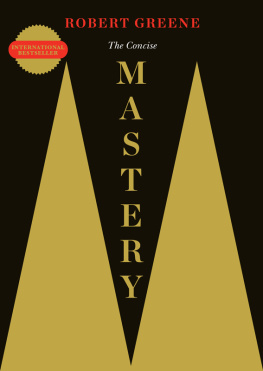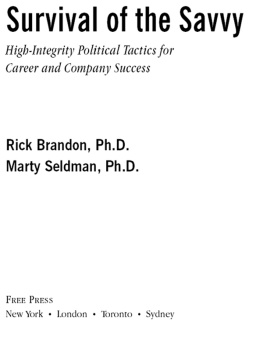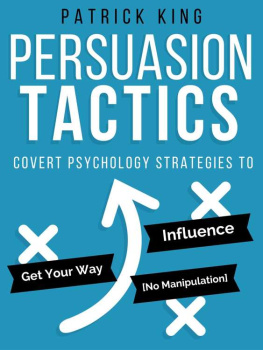WHAT PEOPLE ARE SAYING ABOUT
Modern Machiavelli
This is a book about how to swim with the sharks while living like a dolphin. It provides a unique mix of cunning and integrityas if Machiavelli and Stephen Covey got together and wrote a book on the rules for living. Without being either pessimistic or cynical, the book deals with some hard truths about human nature that we ignore at our peril. The authors advice is both practical and tactical on topics such as dealing with conflict, office politics, difficult personalities, and not letting others take advantage of you. Master these techniques and youll be adept at handling the worst in others, while strengthening whats best in yourself.
Tim Ward, author of Indestructible You and The Master Communicators Handbook
Every person experiencing interpersonal conflict or cut-throat competition should read this book. I have personally benefited from Dr. Bruners consultation and highly recommend his book. It is the opposite of psycho-babble: concrete, specific, and dynamic.
Robert W. Forster, President and CEO, Forster Financial
Modern Machiavelli provides key insights and inspiration to propel your life dramatically forward!
William Eager, speaker, corporate strategist and best-selling author
Modern Machiavelli: 13 Laws of Power, Persuasion and Integrity is a book that crosses the areas of business, psychology, self-help, and ethics. It is a realists manual for effective persuasion and conflict management.
Christine Joo, Ed.D., Christine Joo Psychotherapy
Dr. Bruner and Philip Eager have provided a much-needed treatise on the basic behavioral laws that all of us need to fully understand if we are to truly work together to solve the many issues facing society. This book is not designed to show you how to manipulate co-workers, friends, and family members, but rather provides the reader with a strategic awareness of the many facets that may be in play when individuals interact, regardless of the situation. This book is a must for the reader who is interested in a laymans dive into moral development and offers approaches, through professional insight and examples, on how to uphold the fairness expectations that many of us have grown up with, without compromising our core values that make us who we are.
David White, Ph.D., Associate Dean of Research, University of Tennessee
First published by Changemakers Books, 2017
Changemakers Books is an imprint of John Hunt Publishing Ltd., Laurel House, Station Approach,
Alresford, Hants, SO24 9JH, UK
www.johnhuntpublishing.com
www.changemakers-books.com
For distributor details and how to order please visit the Ordering section on our website.
Text copyright: Troy Bruner and Philip Eager 2016
ISBN: 978 1 78535 611 7
978 1 78535 612 4 (ebook)
Library of Congress Control Number: 2016954752
All rights reserved. Except for brief quotations in critical articles or reviews, no part of this book may be reproduced in any manner without prior written permission from the publishers.
The rights of Troy Bruner and Philip Eager as authors have been asserted in accordance with the Copyright, Designs and Patents Act 1988.
A CIP catalogue record for this book is available from the British Library.
Design: Stuart Davies
Printed and bound by CPI Group (UK) Ltd, Croydon, CR0 4YY, UK
We operate a distinctive and ethical publishing philosophy in all areas of our business, from our global network of authors to production and worldwide distribution.
CONTENTS
To Susan, Wendy, and our clients and colleagues for their vital contributions
Preface
The authors of this book are strategic consultants with backgrounds in psychotherapy. In our work with individuals, couples, business owners and employees, we have noticed a pattern of problems that is seldom researched within academia or any specific discipline including psychology, business management, and ethics. We have studied and learned that under certain circumstances many highly desirable and prosocial human qualities can undermine an individuals efforts to achieve career and relational success. Think of any desirable quality, such as persistence, reliability, generosity, loyalty, etc. These qualities are not necessarily advantageous when interacting with individuals that outwardly conform to social expectations, but in reality are willing to act deceptively or manipulatively when it is to their advantage. People who genuinely try to live according to standards of conduct tend to become demoralized when they realize that their efforts to achieve goals and find success have been sabotaged by the selfish actions of others.
Those who have difficulty detecting and responding to deception or manipulation usually find themselves exasperated. The most common response is to settle for less than deserved in the name of compromise, or worse, choosing to abandon ones ambitions altogether. Imagine what a loss it would have been if Abraham Lincoln had decided, Politics is too corrupt. Im just going to run my little law office and stay out of it. Let someone else run for office. Society, like Nature, abhors a vacuum. When those with personal integrity walk away from success, others gladly fill in the void. On the other hand, when people of personal integrity succeed, the subsequent good that is accomplished can have ripple effects that positively impact the lives of countless individuals.
The core aspects of life such as family, career, and personal growth can be frustrated by the selfishness of those around us. The inability to respond effectively can result in conflict, depression, anxiety, and frustration. But such problems are much less likely for those who master the art and science of engaging selfishness in its many subtle forms: exploitation, manipulation, deceit, betrayal, etc. We must accept that our social world includes many individuals who do not hesitate to act in their own selfish interests, even when it materially or psychologically harms others. In fact, there is merit to the thesis that selfishness is the primary, indirect cause of human suffering. On an individual level, proper social strategy is both protection against selfishness and empowerment for success.
There are of course the others; the salt of the earth parents, co-workers, and friends who are supportive, empathetic, and kind. Many individuals have had the good fortune of surrounding themselves with such positive people. However, the authors of this book do not believe this group represents the majority of the most successful individuals in every environment. The path to success is often associated with a competitive attitude, ambition, and strength of will. Some individuals with these qualities are wonderful people; others are willing to succeed at all costs. Usually where there is more money, power, or status, there will be more corruption, predatory competition, and deceit. On the other hand, even petty things or extremely limited power can be associated with power trips including attempts to dominate or exploit others. Despite these observations, there is no easy way to read others. Selfishness can take subtle forms across a wide spectrum of human experience. Our world is a mix of vices and virtues; joy and pain; loyalty and betrayal. The preoccupation of the authors is to help others discover a path to overcoming oppressive forces in order to succeed in life and attain a high level of confidence in social interactions.












